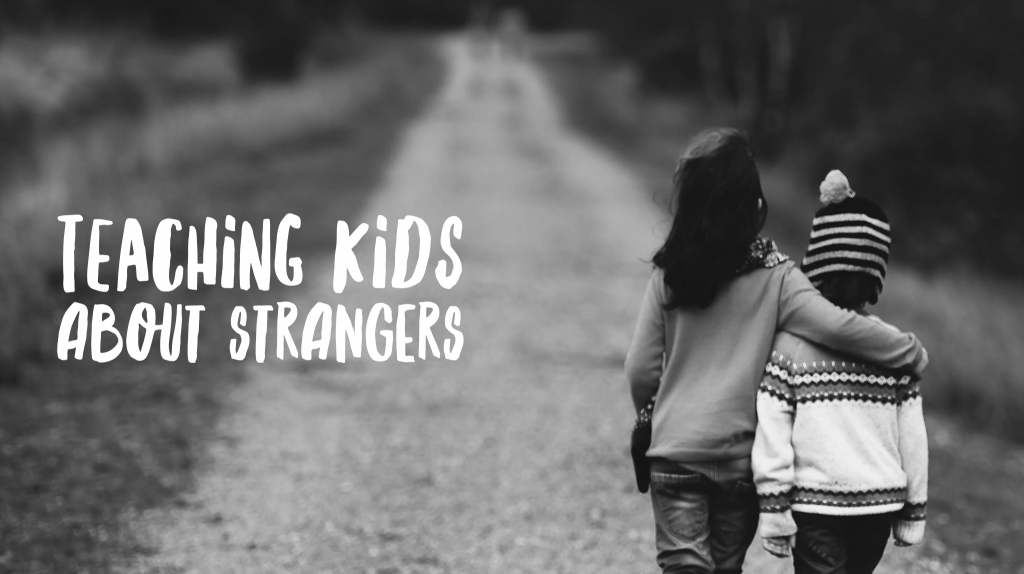At this stage my kids are 3 and 5. If someone says hi to them, when they’re with me, then I naturally encourage them to say hi back. However in light of recent events here in New Zealand, it got me thinking about the fact that we should be teaching our kids about stranger danger.
But how do I do that? I actively encourage my kids to say hi when they’re spoken to, or interact with people. So far in my kids life, they know nothing about stranger danger.
Before I launch into it, I need you to know that the statistics here in New Zealand show that there is a very small percentage of child abductions or indecent assaults and violations that happen by strangers. Unfortunately MOST are committed by the people we trust the most: teachers, bus drivers, scout leaders, baby sitters, extended family members, etc.
It is extremely important we teach our children to trust their instincts.
That being said, this article is about teaching kids about strangers. Here’s what I think will work best with kids when explaining it. Remember to keep the conversation calm – you don’t want to scare your child.
———————
Teach Them What “Stranger” Means
Of course you’re going to want to say “don’t talk to strangers”, but for some children they don’t know what the word “stranger” means: so simply explain it as “don’t talk to people you don’t know unless I’m with you”.
Edited to add: some schools are now teaching their students about “tricky people” rather than strangers. This is because kids can become confused and not want to talk to ANYONE. You can help explain who tricky people are by saying that they tend to ask kids for help: your child should know that adults should don’t ask kids for help. Read more about the Tricky People concept here.
Who Are The “Friendlies”
Explain to your child who the safe people are – the friendlies. Teachers, police officers, security guards or even shop employees. If they can’t find someone like this, then search out for people who look familiar – grandparents, women and people with children who may be able to help. Remind them to trust their instincts: If they don’t have a good feeling about a certain person (any person at all, even the friendlies), they should approach someone else or chat to a parent.
What To Do
The most important thing to explain to your child, is circumstances in which a stranger may approach them in a negative way. Explain to your child that if a stranger ever approaches and offers a ride or treats (like lollies or toys) or asks for help with a task (like helping find a lost dog), they should step away, yell “No!” and leave the area immediately. Your child should tell you or another trusted adult (like a teacher or childcare worker) what happened.
Know The Route
If your children walk to and from school by themselves, ensure they know the way to go and point out “safe” areas. For example, if your child is scared, tell them to go into the dairy; or a local shop. Tell them to keep to main roads (if necessary) and stay in well lit areas. Ensure your child isn’t walking alone (unless necessary) – having a walking buddy can be an awesome way to do this.
Trust Your Instinct
Telling your kids to trust their instinct is huge. If something doesn’t feel right, then they should go with that feeling. Tell your kids to tell you if they ever feel weird around someone. It’s ok to be honest.
Have A Secret Word
Have a special word that ONLY your child, teacher, grandparent AND you know so that if anyone stops and says ‘your mums in hospital and really injured she has asked me to take you to hospital’ – the child will ask for the code word and if they don’t know it scream loud and run to a teacher, friend etc.
Young Kids Might Not Understand
Don’t put too much pressure on yourself or on your children to understand the concept of “don’t talk to strangers”. When I spoke to my 5 year old about it, she just couldn’t grasp what I was saying; and that’s ok. I have started the conversation with her about strangers, and that’s really all that matters.
———————
As a parent all we want to do is protect our children. So when you think your child will understand the concept of strangers, then start chatting to them.
You don’t want to freak them out, but you do want them to know the importance of not talking to people they don’t know – especially when alone.
Check out the following links for more information:
Police NZ – Keeping Ourselves Safe
Police NZ (PDF) – Safely Getting Home
Kiwi Families – Dealing With Stranger Danger
Recently our local school was sent a note by the Police which said:
If approached by someone they don’t know children should be advised the following.
Decline any invitation and move away from the person and vehicle immediately. If possible they should seek out other students/ known people and if safe, take a note of what the person looks like, a description of the vehicle and the registration number.
Once at their destination children should be encouraged to report the incident immediately to a teacher or parent and write down what they saw and heard whilst fresh in their memory.
Also if a vigilant teacher or parent notices someone acting suspiciously around students they should take note of the person and vehicle description and any identifying features.
School staff and parents are advised to contact Police on 111 straight away and provide whatever information they can on this type of behaviour no matter how vague. Police can act on this and possibly identify patterns and trends based on the smallest bit of info.
Have you had the “stranger danger” talk with your kids? What did you find works for you?
——————–









